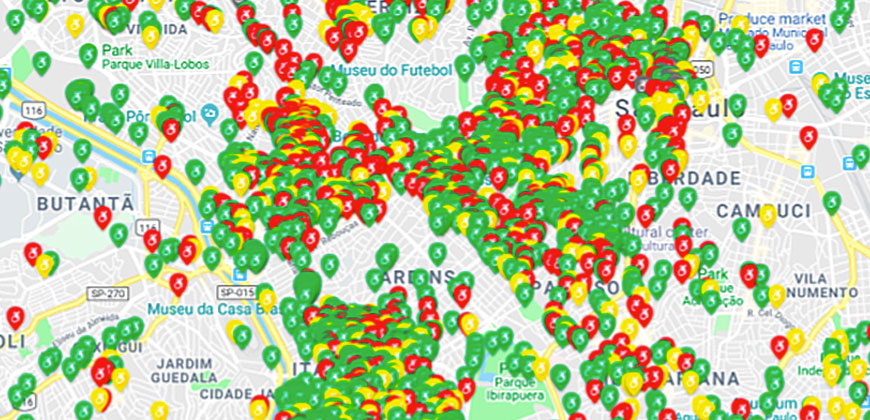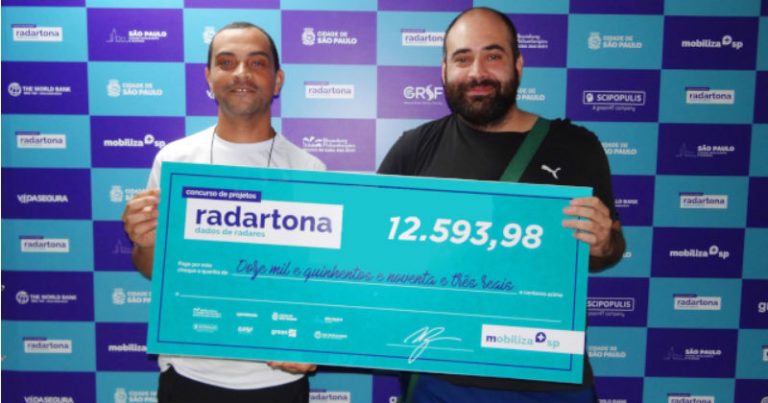Lei em vigor na cidade de São Paulo desde 1º de janeiro de 2017, o Programa Bike SP, que prevê créditos para quem troca o deslocamento motorizado —de carro ou transporte público— pelo deslocamento em bicicleta, ainda não foi implementado.
Dois artigos interessantes publicados na 46ª edição da revista Computação Brasil (CB), onde o primeiro trata sobre “Software Livre: Pré-requisito para a Ciência Aberta” (páginas 12 a 15 da revista) dos autores Christina von Flach e Fabio Kon e o segundo intitulado por “Cidadãos comuns ajudando no combate ao desmatamento das florestas tropicais” (páginas 20 a 23 da revista) dos autores Fernanda Dallaqua, Álvaro Fazenda, e Fabio Faria.
Acesse a revista através do link: https://www.sbc.org.br/images/flippingbook/computacaobrasil/computa_46/pdf/CompBrasil_46.pdf
Text produced by Marcelo Batista Nery and Fabio Kon about the road to take the potential of Information Technology to turn smart cities. See the full text (in Portuguese) in: https://itforum.com.br/colunas/o-caminho-para-cidades-pouco-inteligentes-estamos-na-mesma-pagina/
Roberto Speicys, CEO da Scipopulis, conversa sobre Smart Cities e Inovação na Conexão Smart Solutions da Edição São José dos Campos do Jornal da Manhã da rádio Jovem Pan (FM 94,3).
Assista à entrevista em: https://youtu.be/hwPeqtmaSVk?t=623
Fabio Kon, professor da USP de ciência da computação e coordenador do InterSCity, fala sobre cursos, palestras e ciclos de conferências do ILP + FAPESP sobre ciência e inovações para a mobilidade urbana para rede Alesp, abordando a importância nas pesquisas da área para a qualidade de vida nas cidades.
Assista à entrevista em: https://www.youtube.com/watch?v=N17Fd_Sl97w
“How data is keeping the buses of Rio de Janeiro steadily flowing” presented by Scipopulis in BBC StoryWorks available in https://www.bbc.com/storyworks/the-way-we-move/rio-de-janeiro.
“El automóvil será solamente una infraestructura a la que se accederá a pedido”, supone el científico de la computación Fabio Kon, del IME-USP. A su juicio, esta nueva realidad ofrecerá ventajas, tales como una mejora de la movilidad urbana y la seguridad vial, se reducirán drásticamente los accidentes y se liberarán para fines urbanísticos grandes espacios en zonas privilegiadas que actualmente se destinan al estacionamiento.
Un estudio realizado por Kon y su equipo en el ámbito del Instituto Nacional de Ciencia y Tecnología de Internet del Futuro para Ciudades Inteligentes (InterSCity), con el apoyo de la FAPESP, simuló cómo sería la avenida Paulista, en la capital del estado de São Paulo, si fuera transitada solamente por vehículos autónomos. Los resultados salieron publicados en febrero del año pasado en la revista científica Simulation Modelling Practice and Theory.
Artículo completo de la FAPESP: https://revistapesquisa.fapesp.br/es/el-futuro-de-la-movilidad-con-los-coches-autonomos/
Artículo científico citado: SANTANA, E.F.Z. et al. Transitioning to a driverless city: evaluating a hybrid system for autonomous and non-autonomous vehicles. Simulation Modelling Practice and Theory. v. 107, 102210. feb. 2021.

Questtonó Manyone
Kifayat Ullah, an assistant professor at the CECOS University of Information Technology and Emerging Sciences in Peshawar, Pakistan, came to Brazil for a postdoctoral internship. “I had received offers from European universities but decided to stay in Brazil as I already felt at home in the country and had been awarded a FAPESP fellowship to continue my research on smart vehicular networks at IME-USP within the InterSCity project”.
Full article by FAPESP: https://revistapesquisa.fapesp.br/en/diversity-in-science/
Projects presented in the recent edition of the ILP-FAPESP Science and Innovation Cycle discuss innovations for urban mobility such as analyzing potential cycling routes, safety and comfort for pedestrians and other research.
Full article (in Portuguese) by Agência FAPESP: https://agencia.fapesp.br/vencer-o-desafio-da-mobilidade-em-grandes-cidades-requer-politicas-publicas-baseadas-em-evidencias/39559/
Presentations of ILP-FAPESP Science and Innovation Cycle available in Alesp Youtube Channel
The project began in February 2018 and was developed by a partnership between InterSCity and Guiaderodas. More than a dozen of databases was analyzed to identify which are the regions with the best accessibility conditions according to some criteria related to urban mobility. The results were in Free Wheels portal, besides the interactive map with scores of each region.
Full article (in Portuguese): https://guiaderodas.com/usp-e-guiaderodas-publicam-ranking-de-acessibilidade-de-sp/

Understanding the dynamics of cities and organizing the transit of people and vehicles were the objective of four studies presented in another edition of the Cycle collected by FAPESP in partnership with the Instituto do Legislativo Paulista (ILP) for Science and Innovation. The lecture was streaming on Alesp’s YouTube channel.
More details of the lecture series (in Portuguese) by Agência FAPESP: https://agencia.fapesp.br/ciclo-ilp-fapesp-discute-inovacoes-para-a-mobilidade-urbana/39443/
Researchers at the University of São Paulo (USP) have developed a computer program capable of predicting dengue outbreaks in neighborhoods and cities. The authors were awarded in Italy at an event with projects that use artificial intelligence in health. The goal of the project is to help the authorities in the fight against these diseases.
Full article (in Portuguese) by Veja: https://veja.abril.com.br/saude/maquina-pode-prever-surto-de-dengue-com-ate-tres-meses-de-antecedencia/
TV show produced by TV Brasil: https://tvbrasil.ebc.com.br/reporter-brasil/2022/08/inteligencia-artificial-ajuda-prever-surtos-de-dengue
Full article (in Portuguese) by Agência FAPESP: https://agencia.fapesp.br/modelo-de-aprendizado-de-maquina-pode-ser-utilizado-para-prever-surtos-de-dengue/39217/
Article (in Spanish) by Noticias RTV: https://noticiasrtv.com/el-aprendizaje-automatico-se-puede-utilizar-para-predecir-brotes-de-dengue/
Scipopulis was one of the five Brazilian startups selected to participate in a program aimed at giving visibility to fast-growing startups in the long term, with solutions to fight climate change.
Full article (in Portuguese):
Software created at USP and in use by the CET (city transit company) may guide decisions about new subway lines, bike routes, and automobile traffic.
Full article (in Portuguese): https://www.automotivebusiness.com.br/pt/posts/mobility-now/e-se-carros-autonomos-rodassem-na-avenida-paulista-simulador-mostra-impacto-da-tecnologia/
Roberto Speicys explains that the Trancity platform is able to measure data involving gas emissions, besides calculating circulation values and average speed.
Full article (in portuguese): https://jornal.usp.br/universidade/plataforma-calcula-dados-de-emissao-de-gases-no-transporte-publico/
Tool was created and awarded during a marathon organized by the São Paulo City Hall wich seeks solutions to improve road safety.

Higor Amario and Eduardo Santana, two of the three researchers from The Institute of Mathematics and Statistics of the University of Sao Paulo who won the São Paulo City Hall competition
To read the full article click here (in portuguese)
Link to the full-text here (in portuguese)
An international team of researchers from Brazil and the United States develops a system capable of analyzing the movement of cyclists and pedestrians.
https://www.innovaspain.com/software-politicos-ciudades-mas-amigables/
A software capable of analyzing the displacement of cyclists and pedestrians around the city was developed by an international team of researchers supported by FAPESP. The tool, available free online, aims to help public managers to define strategies and actions that encourage and make non-motorized forms of urban mobility safer.
http://agencia.fapesp.br/software-pode-ajudar-gestores-a-tornar-as-cidades-amigaveis-para-ciclistas-e-pedestres/32345/
Computer scientist Fabio Kon, a professor at USP’s Institute of Mathematics and Statistics, talks about developments and challenging of the web, which completed 30 years in March.
Click here to listen (in portuguese)
Para os professores Fabio Kon e Gisele Craveiro, estabelecer parcerias entre o governo local, universidades e empresas é a chave para a implementação de boas políticas públicas, que podem transformar uma cidade como São Paulo em uma grande metrópole inteligente
The interface between Art and Science – already a theme of much reflection and based on theoretical and practical products – is presented once again in the university environment through the Sons de Silício (Sons of Silicon) occupation, an exhibition of sound art that can be visited in the Espaço das Artes, at the University of São Paulo (USP), until April 26.
http://agencia.fapesp.br/exposicao-de-obras-sonoras-explora-interface-entre-arte-e-ciencia/30217/
SancaLights accurately calculates the value of the Public Lighting Contribution, currently estimated by the government
G1 News Portal: Smart cities use big data to guide development – read the full article (in portuguese)
The study used seven databases to build the mobility ranking
Difficulties and precarious situation in streets and avenues of the capital
https://noticias.r7.com/sp-no-ar/videos/calcadas-desafiam-cadeirantes-em-sao-paulo-26062018
The idea of INaCity is to be an image processing tool that allows the user to gather information and report them to the geographic coordinates.
HackathonUSP 2018.1 gathers young people willing to contribute with new ideas.
Check out our participation on the event “Mobilidade e Cidades Inteligentes” held by FAPESP and ILP. http://agencia.fapesp.br/cidades_inteligentes_dependem_de_acao_conjunta_entre_setores_da_sociedade/27618/
SancaLights provides the exact value of the public lighting tax, currently only estimated by public authorities. http://jornal.usp.br/universidade/alunos-da-usp-criam-hardware-que-pode-diminuir-valor-da-conta-de-luz/
As a result of a research at IME-USP, the platform sought a new perspective in terms of technology for smart cities. https://jornal.usp.br/ciencias/tecnologia/plataforma-permite-criar-solucoes-para-cidades-mais-inteligentes/amp/
The use of Computer Science in initiatives to improve the quality of life in urban centers. http://agencia.fapesp.br/sao_paulo_pode_servir_de_modelo_para_solucoes_em_cidades_inteligentes_/25763/
Smart cities need “big data” to become “big action”. http://agencia.fapesp.br/cidades_inteligentes_precisam_que_big_data_se_torne_big_action/25820/
How do Smart Cities and their Citizens interact? http://navcult.com/8548-2/
How to improve hospital management with technology? http://tvpuc.vrc.puc-rio.br/cgi/cgilua.exe/sys/start.htm?infoid=1381&sid=25